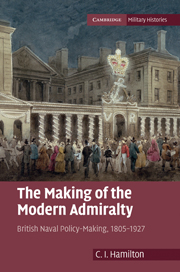Book contents
- Frontmatter
- Contents
- List of tables
- Preface
- Introduction
- 1 Lord Barham's Admiralty: 1805
- 2 Admiralty reform, 1806–1835
- 3 Decision-making at the Admiralty, c. 1806–1830
- 4 Admiralty administration and decision-making, c. 1830–1868. The Graham Admiralty
- 5 The Admiralty reformed again: context and problems, 1868–1885
- 6 Administrative and policy-making responses, c. 1882 onwards
- 7 Fisher and Churchill, and their successors, 1902–1917
- 8 The Naval Staff, planning and policy
- 9 Lord Beatty's Admiralty
- Conclusion
- Appendix 1 First Lords, First Sea Lords and Permanent Secretaries, 1805–1927
- Appendix 2 Acronyms and definitions
- Manuscript sources and select bibliography
- Index
Conclusion
Published online by Cambridge University Press: 03 May 2011
- Frontmatter
- Contents
- List of tables
- Preface
- Introduction
- 1 Lord Barham's Admiralty: 1805
- 2 Admiralty reform, 1806–1835
- 3 Decision-making at the Admiralty, c. 1806–1830
- 4 Admiralty administration and decision-making, c. 1830–1868. The Graham Admiralty
- 5 The Admiralty reformed again: context and problems, 1868–1885
- 6 Administrative and policy-making responses, c. 1882 onwards
- 7 Fisher and Churchill, and their successors, 1902–1917
- 8 The Naval Staff, planning and policy
- 9 Lord Beatty's Admiralty
- Conclusion
- Appendix 1 First Lords, First Sea Lords and Permanent Secretaries, 1805–1927
- Appendix 2 Acronyms and definitions
- Manuscript sources and select bibliography
- Index
Summary
Constants and contrasts
Had Jellicoe had better shells and better intelligence, Jutland might well have been a great victory. Even so, British naval mastery could not have long continued. In the conclusion to his Creighton lecture in 1921, Sir Julian Corbett asked the question: ‘What material advantage did Trafalgar give that Jutland did not give?' Battles, he implied, were less important than certain other circumstances in seapower. It was not Trafalgar that created the conditions for the century of maritime supremacy which followed, nor did Jutland prejudice the allied control of the sea lanes, nor ensure the British government's acceptance of the Washington Treaty in 1921. One should look rather to the influence of geography, political will and – ultimately most important of all – resources. Britain had long been favoured by all these factors, but now, after the First World War, all of them to some degree turned against her.
Successful administration, one might well argue, was itself more important to the Pax Britannica than any grand set-piece battle. Things such as a close attention to correspondence, the regular supply of materials, provisions and pay, and of course due economy and financial control, were all crucial. Knowledge by the opposition, and by the British themselves, of the Royal Navy's fighting prowess doubtless made it more likely that a dispute would be settled once a cruiser had appeared over the horizon, but more fundamental was the fact that the ship and men had been maintained in effectiveness, and had been sent promptly, with proper instructions, so they could intervene in the first place.
- Type
- Chapter
- Information
- The Making of the Modern AdmiraltyBritish Naval Policy-Making, 1805–1927, pp. 306 - 315Publisher: Cambridge University PressPrint publication year: 2011

